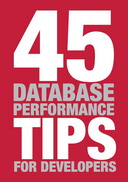
|
FreeComputerBooks.com
Links to Free Computer, Mathematics, Technical Books all over the World
|
|
- Title: 45 Database Performance Tips for Developers
- Author(s) Phil Factor, Grant Fritchey, K. Brian Kelley, Mickey Stuewe, Ike Ellis, Jonathan Allen and Louis Davidson
- Publisher: Red gate books (October 2013)
- Hardcover/Paperback: N/A
- eBook: PDF (21 pages, 1.82 MB)
- Language: English
- ISBN-10: N/A
- ISBN-13: N/A
- Share This:

|
This eBook is a collection of SQL Server performance tips and tricks recommended by some of the smartest minds in the Simple Talk community, including SQL Server MVPs.
Speed up your development with ORMs and discover the gotchas' involved. Learn the best practices for efficiently indexing tables. Get expert advice on writing well-formed SQL queries. Topics covered: ORM Tips, T-SQL Tips, Index Tips, Database Design Tips.
About the Authors- N/A
- Miscrosoft SQL Server
- Sybase SQL Server
- Database Theory and Systems
- Microsoft Windows and .NET
- Database, Data Warehouse and Data Management

- 45 Database Performance Tips for Developers (Phil Factor, et al)
- The Mirror Site (1) - PDF
- Oracle Database Performance and Scalability: A Quantitative Approach (Henry H. Liu)
-
 SQL Performance Explained: Everything Developers Need to Know
SQL Performance Explained: Everything Developers Need to Know
Starting with the basics of indexing and the WHERE clause, this book guides developers through all parts of an SQL statement and explains the pitfalls of object-relational mapping (ORM) tools like Hibernate.
-
 Database Lifecycle Management: Achieving Continuous Delivery
Database Lifecycle Management: Achieving Continuous Delivery
This book describes how to apply the business and technical approaches of Database Lifecycle Management (DLM) in order to make database change management processes more visible, predictable and measurable.
-
 Database Design, 2nd Edition (Adrienne Watt, et al)
Database Design, 2nd Edition (Adrienne Watt, et al)
This book covers database systems and database design concepts. It provides short, easy-to-read explanations of how to get database design right the first time and to help you avoid the many pitfalls that entrap new and not-so-new database designers.
-
 Databases, Types, and the Relational Model: The Third Manifesto
Databases, Types, and the Relational Model: The Third Manifesto
This book can be seen as an abstract blueprint for the design of a DBMS and the language interface to such a DBMS. In particular, it serves as a basis for a model of type inheritance. This book is essential reading for database professionals.
-
 Database Explorations: The Third Manifesto and Related Topics
Database Explorations: The Third Manifesto and Related Topics
This book consists of a collection of exploratory essays on database management - more specifically, on issues arising from and related to The Third Manifesto. The target audience is database professionals.
-
 Transact-SQL: The Building Blocks to SQL Server Programming
Transact-SQL: The Building Blocks to SQL Server Programming
This book will cover different aspects of the Transact SQL (TSQL) language. It takes the readers step by step through the TSQL language, one concept at a time. Each topic covers a particular aspect of TSQL with discussion and examples.
-
 SQL Server Execution Plans, 3rd Edition (Grant Fritchey)
SQL Server Execution Plans, 3rd Edition (Grant Fritchey)
This book is the only in-depth look at how to improve your SQL query performance through careful design of execution plans, leads you right from the basics of capturing plans to diagnose the most common causes of poor query performance, and so optimize your SQL queries, and improve your indexing strategy.
-
 SQL Server Concurrency: Locking, Blocking and Row Versioning
SQL Server Concurrency: Locking, Blocking and Row Versioning
This book is for anyone using SQL Server as a programmer, an administrator, or even a user, who wants to understand how SQL Server manages multiple sessions, and what causes excessive blocking.
-
 A Primer on SQL (Rahul Batra)
A Primer on SQL (Rahul Batra)
This book is an introduction to the basics of SQL. No prior experience with SQL is necessary, but some knowledge of working with computers in general is required. It is not intended as a reference work or for a full time database administrator.
-
 SQL Queries Succinctly (Nick Harrison)
SQL Queries Succinctly (Nick Harrison)
This book shows you how to craft queries in SQL, from basic CRUD statements and slicing and dicing the data, to applying filters and using aggregate functions to summarize the data, solving common problems, navigating hierarchical data, etc.





